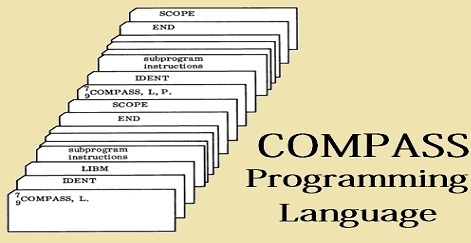
If you’re a programmer, you’ve likely heard of many programming languages, from C++ to Python, Java to Ruby. But have you heard of COMPASS? It’s a language that’s been around for a few decades, and it’s still going strong. In this blog post, we’ll dive into what COMPASS is, what it’s used for, and why it’s worth considering for your next project.
What is COMPASS?
COMPASS stands for “COMmon Programming And Specification System.” It’s a programming language that was first developed in the 1980s, and it’s still being actively developed today. It was designed to be a high-level language that could be used for a wide range of applications, from scientific computing to business applications.
One of the unique things about COMPASS is that it’s both a programming language and a specification language. This means that you can use it to describe what you want your program to do, and then use the same language to actually write the program. This makes it a very powerful tool for software development.
What is COMPASS used for?
COMPASS has been used for a wide range of applications over the years. Some of its most common uses include:
- Scientific computing: Because of its high-level syntax and support for complex data types, COMPASS is well-suited for scientific computing applications.
- Business applications: COMPASS is also used for developing business applications, such as database management systems and accounting software.
- Education: COMPASS is often used as a teaching tool in computer science courses, as it’s a relatively easy language to learn and has a clear syntax.
Why should you consider using COMPASS?
So why should you consider using COMPASS for your next project? Here are just a few reasons:
- Easy to learn: COMPASS has a simple and easy-to-understand syntax, making it a great language for beginners.
- Versatile: As we mentioned earlier, COMPASS can be used for a wide range of applications, from scientific computing to business applications.
- Powerful: COMPASS has a lot of built-in features that make it a powerful language for software development. For example, it supports complex data types like matrices and arrays, as well as object-oriented programming.
- Mature: COMPASS has been around for decades, which means that it’s a mature language with a lot of community support. This can make it easier to find help and resources when you need them.
In conclusion, COMPASS is a powerful and versatile programming language that’s worth considering for your next project. Whether you’re a beginner or an experienced programmer, COMPASS has a lot to offer. So why not give it a try?
Advantages
Sure, here are some advantages of the programming language COMPASS:
- Easy to learn: COMPASS has a simple and easy-to-understand syntax, making it a great language for beginners.
- Versatile: COMPASS can be used for a wide range of applications, from scientific computing to business applications.
- Powerful: COMPASS has a lot of built-in features that make it a powerful language for software development. For example, it supports complex data types like matrices and arrays, as well as object-oriented programming.
- Mature: COMPASS has been around for decades, which means that it’s a mature language with a lot of community support. This can make it easier to find help and resources when you need them.
- Concurrent Programming: COMPASS supports concurrent programming, which means that it can handle multiple tasks at the same time, making it great for applications that require parallel processing.
- Code Reusability: COMPASS is designed with code reusability in mind, which makes it easy to reuse code and build on top of existing projects.
- Cross-platform compatibility: COMPASS can run on a variety of platforms, including Windows, Linux, and macOS, making it a great choice for cross-platform development.
Overall, the advantages of COMPASS make it a versatile and powerful tool for software development that can be used by beginners and experts alike.




